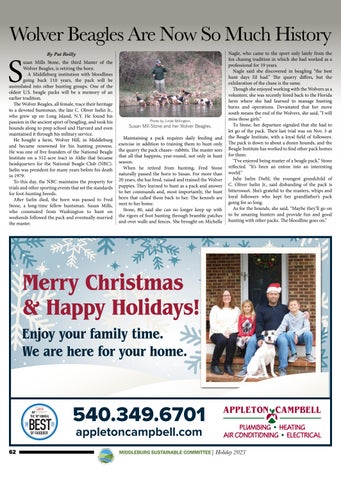Wolver Beagles Are Now So Much History
S
By Pat Reilly
usan Mills Stone, the third Master of the Wolver Beagles, is retiring the horn. A Middleburg institution with bloodlines going back 110 years, the pack will be assimilated into other hunting groups. One of the oldest U.S. beagle packs will be a memory of an earlier tradition. The Wolver Beagles, all female, trace their heritage to a devoted huntsman, the late C. Oliver Iselin Jr., who grew up on Long Island, N.Y. He found his passion in the ancient sport of beagling, and took his hounds along to prep school and Harvard and even maintained it through his military service. He bought a farm, Wolver Hill, in Middleburg and became renowned for his hunting prowess. He was one of five founders of the National Beagle Institute on a 512-acre tract in Aldie that became headquarters for the National Beagle Club (NBC). Iselin was president for many years before his death in 1979. To this day, the NBC maintains the property for trials and other sporting events that set the standards for foot-hunting breeds. After Iselin died, the horn was passed to Fred Stone, a long-time fellow huntsman. Susan Mills, who commuted from Washington to hunt on weekends followed the pack and eventually married the master.
Photo by Linda Millington.
Susan Mill Stone and her Wolver Beagles. Maintaining a pack requires daily feeding and exercise in addition to training them to hunt only the quarry the pack chases--rabbits. The master sees that all that happens, year-round, not only in hunt season. When he retired from hunting, Fred Stone naturally passed the horn to Susan. For more than 20 years, she has bred, raised and trained the Wolver puppies. They learned to hunt as a pack and answer to her commands and, most importantly, the hunt horn that called them back to her. The kennels are next to her home. Stone, 80, said she can no longer keep up with the rigors of foot hunting through bramble patches and over walls and fences. She brought on Michelle
Nagle, who came to the sport only lately from the fox chasing tradition in which she had worked as a professional for 19 years. Nagle said she discovered in beagling “the best hunt days I’d had.” The quarry differs, but the exhilaration of the chase is the same. Though she enjoyed working with the Wolvers as a volunteer, she was recently hired back to the Florida farm where she had learned to manage hunting barns and operations. Devastated that her move south means the end of the Wolvers, she said, “I will miss those girls.’’ To Stone, her departure signaled that she had to let go of the pack. Their last trial was on Nov. 5 at the Beagle Institute, with a loyal field of followers. The pack is down to about a dozen hounds, and the Beagle Institute has worked to find other pack homes for them. “I’ve enjoyed being master of a beagle pack,” Stone reflected. “It’s been an entree into an interesting world.” Julie Iselin Diehl, the youngest grandchild of C. Oliver Iselin Jr., said disbanding of the pack is bittersweet. She’s grateful to the masters, whips and loyal followers who kept her grandfather’s pack going for so long. As for the hounds, she said, “Maybe they’ll go on to be amazing hunters and provide fun and good hunting with other packs. The bloodline goes on.”
Merry Christmas & Happy Holidays! Enjoy your family time. We are here for your home.
540.349.6701 appletoncampbell.com
62
MIDDLEBURG SUSTAINABLE COMMITTEE| Holiday 2023























































